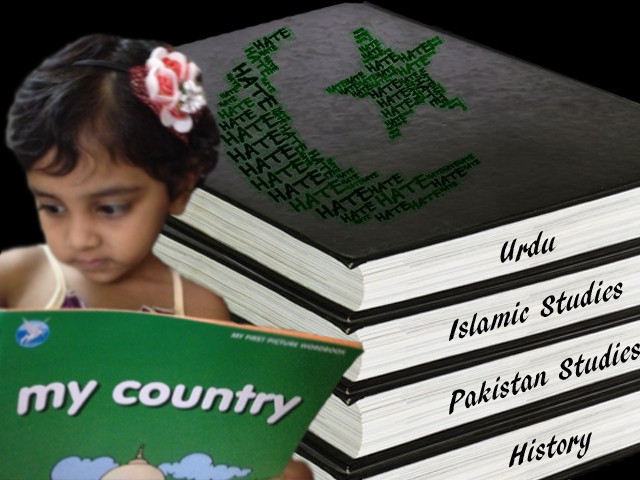The issue of school curriculum has been under discussion in Khyber-Pakhtunkhwa (K-P) for some time now. The 18th Amendment devolved the education sector to the provinces but that has yet to bear fruit, since the leaders who have decided to take up the responsibility of planning a ‘better’ future for the youth of K-P still need to achieve some constructive results.
Playing its ‘due’ role, the coalition government in the province wants to change what is being taught to children at schools. The changes desired are within the lines of ‘religious’ and ‘national’ teachings, according to the members. They want chapters on national heroes like Bacha Khan to remain in the textbooks – a reasonable demand as children should be well aware of the country’s history. However, the text on certain personalities has been considered ‘objectionable’. For instance, a chapter on Raja Dahir has been asked to be removed from the textbooks, despite him being an important part of Indo-Pakistan history.
Why?
History is one of the most important subjects in any curriculum. It helps provide clarity in hindsight and guidance which can only be achieved when all sides of the picture are shown. Deciding between who to make a hero and who the villain is the first problem; this gives a very subjective picture and is likely to be different for every person and community. But by erasing them completely from our textbooks, have we not decided to deprive our children of learning about human variety?
It is a fact agreed upon by many that books have the ability to take its reader to places they may not be able to go physically. By teaching students about personalities from not only Indo-Pak history but from the history of different countries across the globe, they can be exposed to a world outside their own, thereby helping them broaden their horizons.
There have also been talks of minimising any knowledge based on religions of the minorities in Pakistan. Pulling out the mention of a part of the population from the textbooks does not erase the fact that they are also citizens of our country and that they exist in this world – you cannot isolate a child’s mind in this manner.
When a child is growing up, he is gradually acquainted with the people and places around him. This is usually done by parents or guardians who keep repeating relations and names of things to the child. As the child grows older, he is also taught about the name of the street their house is on. All this is taught simply to familiarise the child with his surroundings. But familiarity cannot be confined to their own home. There is a world outside that exists and at some point in their lives, these children will have to face it; keeping them sheltered from dissenting worldviews or leaving them ignorant to important parts of history will make it very hard for them to cope with the advances of the world – advances that have been made after understanding that history shaped them to be the way they are today.
And this is where the role of books comes in. Alienating a child from the expectations of the world, depriving him from information that gives him the ability to form his own opinions is very important. If these books, however, betray the naïve trust of a child and only present the lopsided image of the world, no one but the child suffers. Not letting the child understand the difference between various communities, cultures, traditions, people and religion will only detach the child from a reality he deserves to know about. Not understanding this reality and giving the child a foundation of rigidity and conformism in thinking will only breed inflexibility and intolerance.
Instead of debating over texts related to religion, national heroes and national villains, we should work on assembling and including text on viruses that are plaguing the nation. Children should be taught about polio, hepatitis, dengue and other viruses. They should be able to understand how to protect themselves and be responsible citizens. They should be taught comparative religious studies, and science and other relevant courses should be taught without a religious tilt. They should be taught to respect every living creature on this planet – they should be taught that there will be different opinions they will come across, but it is our responsibility to respect each one; whether we agree with them or not. The principles of Islam – treating your elders with respect, the old with patience and children with love, regardless of their religious backgrounds, keeping yourself and your surroundings clean, saying no to violence and all the others – should be taught to them.
Juxtaposing education with politics is the making of an unjust education system that will churn out graduates with distorted, and even unacceptable, worldviews. The children are the ones who suffer, and by extension, so does the country.
Have we not suffered enough already?
In Pakistan today, there is no acceptance for minority groups, in fact, many a times they are forced to change their religion or retreat lest they be killed or burnt. In the past we have let a number of successive governments use education as a platform to forward their personal agendas. And we are completely blind if we cannot see the impact it has had on us today. The violence and intolerance that prevails today gives evidence to just this.
We let them do this for several years and we are reaping the seeds today. But today, we are in a better position to see what we had to endure, and we must make sure our children and their children do not go through the same. We have to say no to marginalised history. We have to say no to tilted science. We have to say no to learning about one religion only. We have to say no to our education system becoming a victim of politics again and again.
Instead of jeopardising our future by poisoning our past, we need to become more aware about what is being taught to our children in school. We need to take a stand and hold our government responsible for advocating intolerance, rigidity and inflexibility. We need to make sure they start from the grass-root level and let our children embrace the world, in all its colours, varieties and glory. We need to protect our children from becoming political guinea pigs.
Can the Pakistani education system stop catering to political agendas please?
Juxtaposing education with politics will only churn out graduates with a distorted, and even unacceptable, worldview.



COMMENTS
Comments are moderated and generally will be posted if they are on-topic and not abusive.
For more information, please see our Comments FAQ